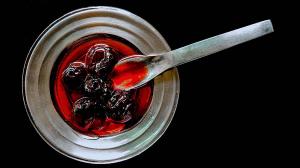In the olden days, whether in Greece, Turkey, Cyprus, the Balkans, and also in further away Romania and some Middle-Eastern countries, every guest visiting any home, no matter how rich or poor the household was, could expect a cup of hot coffee, a cold glass of water and a small plate of room-temperature home-made "spoon sweets", particularly in the late fall, winter and early spring months, when fresh fruits were unavailable.
Spoon sweets were prepared, often using sweet, sour or acidic fruits or ripe and even greener un-ripened fruits and sometimes their rinds and peels too and were expected to last until the next year’s harvest.
You could expect sour cherry (if available) spoon sweets or regular cherry, grape, baby fig, orange rind, lemon rind, apricot, pear, quince and sometimes even baby walnuts (before the outer shell hardened), watermelon rind and at times, the fancier rose petal versions.
Using small whole pitted fruits is the easiest option compared to citrus rinds that need to be boiled several times before preserving and sweetening and watermelon or melon rinds that require soaking in limewater first.
A spoon sweet is not a jam nor a marmalade, but a sweetened and thickened preparation of whole fruits or larger pieces of fruits, that remain quite firm and almost crunchy (depending on the fruits used) resting in a thickened aromatic syrup.
I used sweet cherries simply because sour cherries are less easy to find and quite expensive but if you can find them, just use those instead without adding more sugar to the recipe.
My method is quite close to the candied fruit method. I do not boil the fruits with the juices for a long period of time and then transfer the preparation to jars. I prefer to spread the process over several days, preserving the fruits’ shapes and firmness by letting the fruits marinate and rest in the hot syrup that slowly cools down for 24 hour periods, before re-boiling the syrup separately from the fruits again and adding the fruits back in to continue absorbing the sweet flavorful syrup and plumping them up a bit more each time. The extra steps are not time-consuming nor active preparation time, just patience and waiting time and a guarantee for firmness and plumpness.
Every household would prepare their versions every year and carefully hide them from the kids, because it was unfathomable, back in those days, to not be able to serve spoon sweets to your surprise or last-minute guests, simply because the kids discovered the hiding place and gobbled it all up ! Back in the old days, people cared what other people thought about them and how they received others or how they were received by others.
Household Hospitality, no matter how simple and modest or grandiose and sophisticated, was important to all … :)














